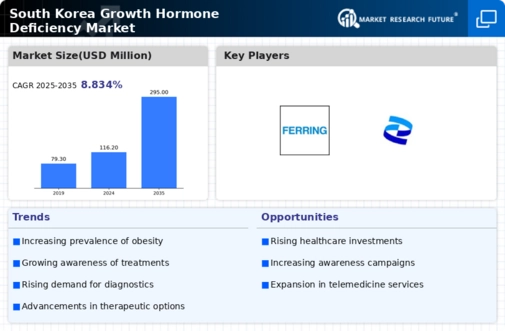Rising Healthcare Expenditure
The growth hormone-deficiency market is positively influenced by the rising healthcare expenditure in South Korea. With the government and private sectors investing more in healthcare services, there is an increased focus on treating chronic conditions, including growth hormone deficiency. In 2025, healthcare spending is projected to reach approximately 9.5% of GDP, reflecting a commitment to improving health outcomes. This financial support enables better access to innovative treatments and therapies for patients suffering from growth hormone deficiency. As healthcare expenditure continues to rise, the growth hormone-deficiency market is expected to expand, driven by increased availability of treatment options and improved patient access to care.
Advancements in Diagnostic Technologies
The growth hormone-deficiency market is benefiting from advancements in diagnostic technologies that enhance the accuracy and speed of identifying growth hormone deficiencies. Innovative testing methods, such as MRI scans and blood tests, allow for more precise assessments of hormone levels and pituitary function. These advancements not only facilitate earlier diagnosis but also improve treatment outcomes by enabling tailored therapeutic approaches. In South Korea, the integration of these technologies into clinical practice is becoming increasingly common, leading to a rise in diagnosed cases. As healthcare providers adopt these advanced diagnostic tools, the growth hormone-deficiency market is likely to see an uptick in demand for treatment options, as more patients are identified and referred for therapy.
Growing Interest in Pediatric Endocrinology
The growth hormone-deficiency market is experiencing a surge in interest in pediatric endocrinology, which plays a crucial role in diagnosing and treating growth disorders in children. As more healthcare professionals specialize in this field, the quality of care for patients with growth hormone deficiency is likely to improve. This trend is particularly relevant in South Korea, where there is a growing recognition of the importance of early intervention in pediatric patients. Enhanced training and education for healthcare providers in pediatric endocrinology may lead to increased referrals and diagnoses, thereby expanding the growth hormone-deficiency market. The focus on specialized care is expected to drive demand for innovative treatment options tailored to the unique needs of children.
Increased Patient Advocacy and Support Groups
The growth hormone-deficiency market is being positively impacted by the emergence of patient advocacy and support groups in South Korea. These organizations play a vital role in raising awareness about growth hormone deficiency and its implications for affected individuals and families. By providing resources, education, and emotional support, these groups empower patients to seek diagnosis and treatment. The increased visibility of growth hormone deficiency through advocacy efforts is likely to lead to higher diagnosis rates and, consequently, greater demand for treatment options. As more individuals become informed about their condition and available therapies, the growth hormone-deficiency market is expected to grow, driven by a more engaged and proactive patient population.
Increasing Prevalence of Growth Hormone Deficiency
The growth hormone-deficiency market is experiencing a notable increase in prevalence rates within South Korea. Recent studies indicate that approximately 1 in 3,000 children may be affected by this condition, leading to a growing demand for effective treatments. As awareness of growth hormone deficiency rises among healthcare professionals and the general public, more individuals are seeking diagnosis and treatment options. This trend is likely to drive market growth, as early intervention can significantly improve patient outcomes. Furthermore, the increasing prevalence of obesity and related metabolic disorders may contribute to a higher incidence of growth hormone deficiency, further expanding the patient population. Consequently, the growth hormone-deficiency market is poised for expansion as healthcare systems adapt to meet the needs of this growing demographic.
















